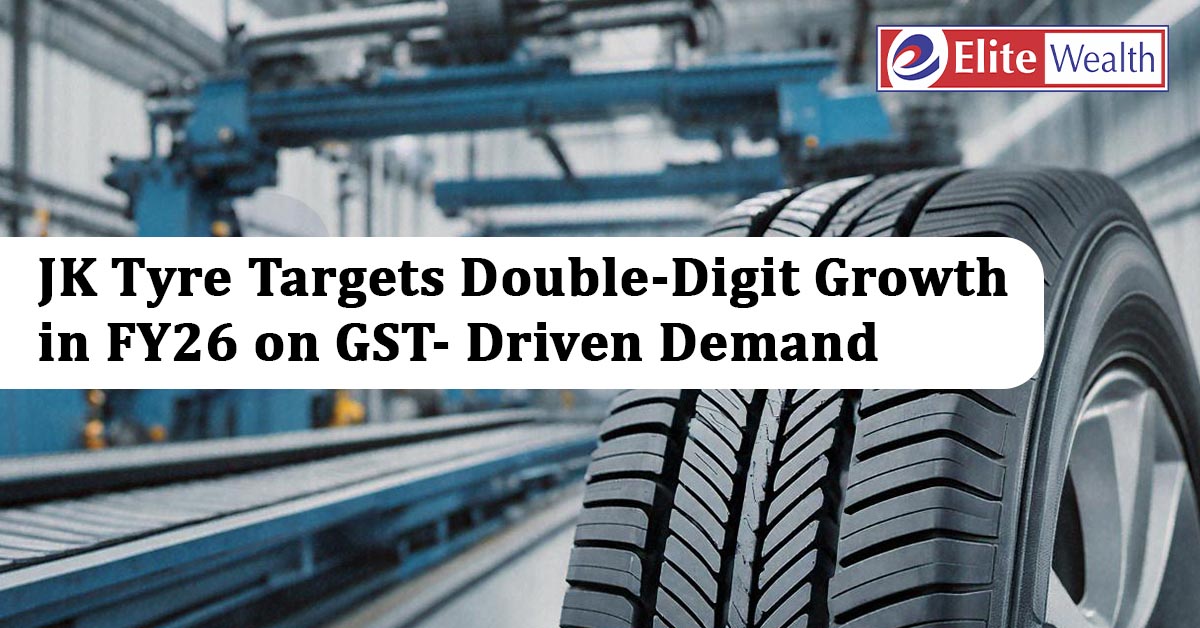
JK Tyre & Industries expects to bounce back with double-digit revenue growth in FY26, supported by stronger demand for tyres following recent GST cuts and a pickup in automobile sales across segments.
The company, which reported muted revenues in FY25, is banking on both the original equipment manufacturer (OEM) and replacement markets to drive its performance this year.
Boost from GST Cuts
“The tyre demand outlook for this year is quite strong,” said Anshuman Singhania, managing director of JK Tyre & Industries, while addressing reporters on Thursday.
The GST Council’s decision to reduce tax rates effective September 22 is expected to lift auto sales by 8–9%, particularly in consumer-facing categories such as passenger cars, two-wheelers, and three-wheelers. The farm sector, too, is showing early signs of revival in rural areas.
According to Singhania:
- Passenger car and farm equipment sales are expected to post high single-digit growth.
- Commercial vehicles, initially projected for low single-digit growth, now look set for mid-single digit expansion.
- Two- and three-wheelers are already witnessing buoyant demand.
“With this backdrop, we are confident of delivering double-digit revenue growth this fiscal,” he said.
Performance in FY25
JK Tyre’s consolidated revenue fell slightly to ₹14,692.92 crore in FY25 from ₹15,001.78 crore in FY24. The company derives about 60% of its revenue from the replacement market and the remaining 40% from OEMs.
To meet the anticipated demand surge post-GST cuts and ahead of the festive season, JK Tyre is ramping up inventory. The GST reductions include:
- Two-wheelers (up to 350cc) and entry-level cars: cut from 28% to 18%
- Tractors above 1,800cc: cut from 12% to 5%
- Trucks and commercial vehicles: cut from 28% to 18%
Input Costs and Pricing
Raw material prices rose 10% in FY25, accounting for nearly 67% of tyre production costs, leading to an average 7% increase in tyre prices. JK Tyre managed to pass on about 4.5% of this to customers, leaving a gap of 3.5%.
However, between Q1FY26 and Q4FY25, prices fell 2.5%, easing some cost pressures. “We expect raw material prices to remain range-bound in the coming quarters,” Singhania added.
Mitigating Challenges, Expanding Markets
JK Tyre operates 11 manufacturing plants with a combined capacity of 35 million tyres. The company imports nearly half of its rubber needs, leaving it exposed to global price volatility.
To counter challenges in exports, particularly from the US where a 50% tariff has been imposed, JK Tyre is redirecting supply through its Mexico plant, benefitting from delayed tariff implementation and the US–Mexico–Canada Agreement, which provides duty-free access.
The company exports to the UAE and Europe, and remains the largest exporter of truck radials to the EU and UK. It is also exploring newer markets in Africa and Asia, with exports contributing 12–15% of total revenues.
Disclaimer:
This article is intended solely for educational and informational purposes. The securities or companies mentioned are provided as examples and should not be considered as recommendations. Nothing contained herein constitutes personal financial advice or investment recommendations. Readers are advised to conduct their own research and consult a qualified financial advisor before making any investment decisions.
Investments in securities markets are subject to market risks. Please read all related documents carefully before investing.
